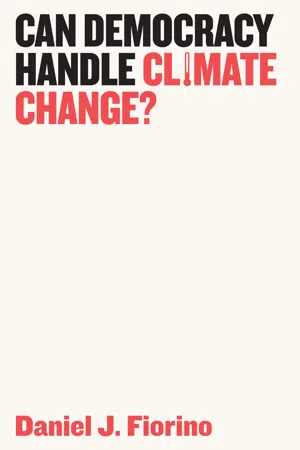Can democracy handle climate change? Some experts think not. According to the distinguished scientist and founder of the Gaia theory, James Lovelock, “Even the best democracies agree that when a major war approaches, democracy must be put on hold for the time being. I have a feeling that climate change may be an issue as severe as a war. It may be necessary to put democracy on hold for a while.”1 The problem with democracies, so the argument goes, is that they are crippled by inertia, dominated by vested interests, and incapable of responding to existential risks such as climate change.
For Lovelock and other skeptics, democracies cannot make the hard choices needed to avoid the worst impacts of a changing climate for the rest of this century and beyond. They rely too much on the consent of a public that puts short-term gratification over long-term well-being. Democracies must respect individual rights and follow procedures that are unlikely to deliver the actions required within the necessary time frame. Voters lack the scientific knowledge needed to grasp the causes of climate change and its multiple threats to humans and the planet. Democracies are too slow, materialistic, and sclerotic to meet the complex challenges involved.
In contrast, the skeptics argue, authoritarian regimes are better able to impose solutions from the top down, no matter how unpleasant they may be in the short term. They can overcome opposition from powerful interests in fossil fuels, agriculture, land development, and elsewhere in order to enforce reductions in emissions and changes in economic and social systems. Unlike democratic regimes, they are free to implement the proposals of experts who grasp the complexities of climate science, and can override popular desires for ever-increasing consumption and immediate material gratification to achieve what is best for citizens and the planet in the long run.
This skepticism is reflected in public views in many parts of the world, even in the more established and successful democracies. Economic uncertainty, rising economic inequality, mass immigration, and changes resulting from globalization have led many citizens to doubt the value of democracy. Drawing upon data from the World Values Survey, Roberto Foa and Yascha Mounk highlight this broad dissatisfaction with democratic institutions and values. In France, for example, two-fifths of respondents in 2016 thought the country should be run by an authoritarian government, while two-thirds thought authority for “unpopular but necessary reforms” should be handed over to “unelected experts.” Likewise, in the United States, the proportion supporting military rule rose from one in sixteen in 1995 to one in six in 2016. There is a generational aspect to these findings: 72 percent of Americans born before World War II say that living in a democracy is “essential”; for post-1980 millennials the comparable response is 30 percent.2 Similar trends are apparent in other countries.
The skeptics’ case has certainly gained currency given recent events in the United States and China, the two largest economies, and greenhouse gas emitters, in the world. Yet it is authoritarian China, not the democratic United States, that is often perceived to be moving to address climate change. It is on a path to stabilizing emissions ahead of the schedule it committed to in the 2015 Paris Agreement on climate change, and is making major investments in renewable energy technologies – twice the US levels in 2016.
In contrast, although US emissions fell some 10 percent between 2005 and 2014, and several climate mitigation initiatives were introduced under President Barack Obama, this course was rapidly reversed at the national level following the election of Donald Trump. President Trump announced his intent to withdraw from the Paris Agreement; to reverse regulations designed to reduce emissions, including the critically important Clean Power Plan; to drastically cut renewable energy and efficiency funding; and to undo strict vehicle fuel economy standards.3
This chapter introduces the problem of climate change and the challenges it poses to governance. As Ross Garnaut wrote in a report for the Australian government in 2011: “Climate change is like no other environmental problem that humanity has ever faced … the failure of our generation [to address it] would lead to consequences that would haunt humanity to the end of time.”4
What is climate change?
One reason given for doubting democracy’s ability to address the problem adequately is that global efforts to reduce greenhouse gas emissions and manage the other causes of climate change have been, to this point, insufficient to avoid many of its worst impacts. Based on the assessments of the Intergovernmental Panel on Climate Change (IPCC) and other scientific bodies, atmospheric concentrations of greenhouse gases would have to level off at some 450–550 parts per million by 2050.5 Yet, far from meeting this target, the world is on a path of increasing emissions and land-use changes that will only add to the problem.6
The United Nations defines the issue as “a change of climate which is attributed directly or indirectly to human activity that alters the composition of the global atmosphere and which is in addition to natural climate vulnerability observed over comparable time periods.”7 The key here is the link to human activity and its role in contributing to abnormal variations that have profound effects. The most recent report of the US Global Change Research Program, for example, concluded “that it is extremely likely that human activities, especially emissions of greenhouse gases, are the dominant cause of the observed warming since the mid-20th century.”8
For our purposes, climate change refers to the increase in global average temperatures that has occurred over roughly the past half-cen...




